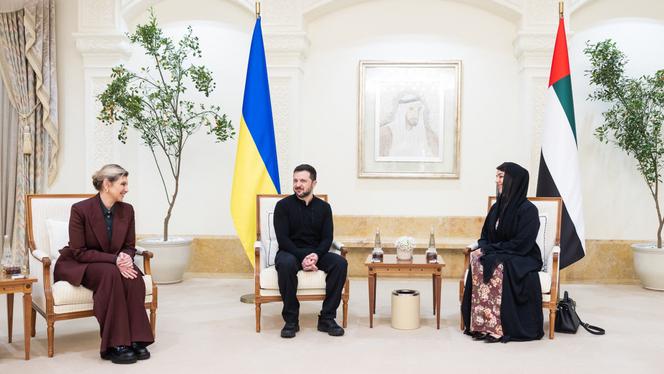


US President Donald Trump said Sunday, February 16, that he could meet "very soon" with Vladimir Putin, adding he believes his Russian counterpart genuinely wants to stop fighting in Ukraine. "No time set, but it could be very soon," Trump told reporters, hours after Secretary of State Marco Rubio sought to play down expectations of upcoming high-level talks in Riyadh on ending the war.
With Rubio set to lead a high-level American delegation at the discussions with Russian officials in Saudi Arabia's capital in the coming days, a flurry of diplomacy was taking place as the brutal Ukraine war nears its third anniversary.
Trump, addressing reporters after a flight on Air Force One, said his team has been speaking "long and hard" with Russian officials, including his Middle East envoy Steve Witkoff whom the president said met with Putin for about three hours recently. "I think he wants to stop fighting," Trump said of Putin.
Asked whether he believes Putin wants to seize the entirety of Ukraine, Trump said: "That was my question to him." "If he's going to go on... that would have caused me a big problem," Trump added. "I think he wants to end it, and they want to end it fast. Both of them," he said, adding "Zelensky wants to end it too."
Ukrainian President Volodymyr Zelensky meanwhile said Sunday he believes Russia is preparing to "wage war" against a weakened NATO should Trump dilute US support for the alliance. Trump appeared to dismiss Zelensky's remarks, telling reporters he was "not even a little bit" concerned about the Ukrainian leader's messaging.
The Republican had repeatedly insisted he would end the Ukraine conflict in a single day if he returned to the White House, but Rubio stressed it would "not be easy" to resolve such a long-running, bloody and complex conflict. "A process towards peace is not a one-meeting thing," America's top diplomat said in an interview with CBS on the sidelines of the Munich Security Conference.
Rubio is set to lead a high-level US team to Riyadh, but it remains unclear whether there will be any Ukrainian participation. Rubio said he wasn't even sure who Moscow was sending. "Nothing's been finalized yet," he said, adding the aim was to seek an opening for a broader conversation that "would include Ukraine and would involve the end of the war."
Witkoff and US National Security Adviser Michael Waltz are both expected to attend the talks. Trump and Putin held a lengthy phone call Wednesday in which they agreed to start ceasefire negotiations immediately. The call blindsided NATO allies as well as Kyiv, with Zelensky insisting there should be "no decisions about Ukraine without Ukraine." "Right now there is no process," said Rubio, who spoke by phone Saturday with Russian Foreign Minister Sergei Lavrov. "One phone call does not make peace."
In an interview with NBC broadcast Sunday, Zelensky had said Putin was a serial liar and could not be trusted as a negotiating partner. "I don't think in geopolitics, anyone should trust anyone," Rubio said. "The next few weeks and days will determine whether (Putin) is serious or not."
UK Prime Minister Keir Starmer said Sunday he was ready to send troops to Ukraine if it was needed to ensure the security of Britain and Europe.
The UK was playing a leading role in supporting Kyiv in the war against Russia which "also means being ready and willing to contribute to security guarantees to Ukraine by putting our own troops on the ground if necessary," Starmer wrote in the Daily Telegraph. "I do not say that lightly," Starmer added, saying he felt "very deeply the responsibility that comes with potentially putting British servicemen and women in harm's way. "But any role in helping to guarantee Ukraine's security is helping to guarantee the security of our continent, and the security of this country."
Starmer confirmed he would join a top-level meeting to be held in Paris on Monday to address growing concerns over US efforts to end the war in Ukraine. He also said that he would be meeting US President Donald Trump "in the coming days", adding the UK had "a unique role" to play in ensuring Europe and the United States work closely together. "US support will remain critical and a US security guarantee is essential for a lasting peace, because only the US can deter Putin from attacking again," Starmer said, referring to Russian President Vladimir Putin.
The heads of government of Germany, the United Kingdom, Italy, Poland, Spain, the Netherlands and Denmark are all expected at the meeting ahead of the third anniversary of Russia's invasion of Ukraine on February 24.
European countries fear that if Ukraine is forced into a bad deal by Washington then that will leave Putin claiming victory and the continent at the mercy of an emboldened Moscow. "We are facing a once-in-a-generation moment for the collective security of our continent," Starmer warned in his article published late Sunday. "This is not only a question about the future of Ukraine – it is existential for Europe as a whole."
